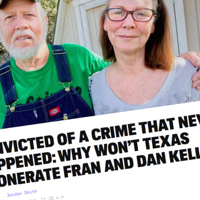Rascals case in brief
In the beginning, in 1989, more than 90 children at the Little Rascals Day Care Center in Edenton, North Carolina, accused a total of 20 adults with 429 instances of sexual abuse over a three-year period. It may have all begun with one parent’s complaint about punishment given her child.
Among the alleged perpetrators: the sheriff and mayor. But prosecutors would charge only Robin Byrum, Darlene Harris, Elizabeth “Betsy” Kelly, Robert “Bob” Kelly, Willard Scott Privott, Shelley Stone and Dawn Wilson – the Edenton 7.
Along with sodomy and beatings, allegations included a baby killed with a handgun, a child being hung upside down from a tree and being set on fire and countless other fantastic incidents involving spaceships, hot air balloons, pirate ships and trained sharks.
By the time prosecutors dropped the last charges in 1997, Little Rascals had become North Carolina’s longest and most costly criminal trial. Prosecutors kept defendants jailed in hopes at least one would turn against their supposed co-conspirators. Remarkably, none did. Another shameful record: Five defendants had to wait longer to face their accusers in court than anyone else in North Carolina history.
Between 1991 and 1997, Ofra Bikel produced three extraordinary episodes on the Little Rascals case for the PBS series “Frontline.” Although “Innocence Lost” did not deter prosecutors, it exposed their tactics and fostered nationwide skepticism and dismay.
With each passing year, the absurdity of the Little Rascals charges has become more obvious. But no admission of error has ever come from prosecutors, police, interviewers or parents. This site is devoted to the issues raised by this case.
On Facebook
Click for earlier Facebook posts archived on this site
Click to go to
Today’s random selection from the Little Rascals Day Care archives….
Click for earlier Facebook posts archived on this site
Click to go to
Today’s random selection from the Little Rascals Day Care archives….
An encore for ritual abuse panic? ‘You can bet on it’
 May 18, 2012
May 18, 2012
“Discredited child-sex rings like McMartin actually may not be a bogeyman of the past. Some parents, therapists and child-protection professionals continue to believe ritual sex abuse took place at McMartin preschool.
“ ‘In 10 to 15 years, there will be an attempt to rehabilitate the ritual abuse scare,’ says (James Wood, psychologist at the University of Texas El Paso). ‘You can bet on it.’ ”
– From “Who Was Abused?” by Maggie Jones in the New York Times (Sept. 19, 2004)
Toppin’s interview notes: ‘Just a lot of extra paper’

Brenda Toppin
Aug. 1, 2017
“In the McMartin case, the defense used videotapes of therapists’ interviews with the children to suggest that the idea of abuse had been implanted.
“[Ofra] Bikel says, ‘The authorities in North Carolina [in the Little Rascals case], who I know met with the McMartin prosecutors, learned from them that the therapists’ notes should just be summaries. They learned that if you want to win a case, it’s a bad idea to have tapes around.’
“The prosecution interviewer [Brenda Toppin] is shown testifying that she cannot say why her original interview notes were destroyed: ‘It’s just a lot of extra paper,’ she said.”
– From “Justice Abuse? ‘Frontline’ Documentary Takes Hard Look At A Small-town Scandal” by Bart Mills in the Chicago Tribune (July 20, 1993)
![]()
‘There are no profiles in courage out there’

theintercept.com
The Intercept article
April 25, 2016
“Prosecutors wield extraordinary, unparalleled, and unchecked power. ‘They alone decide who to prosecute for criminal offenses, what charges to bring against them, and what punishments to seek,’ as the National Registry (of Wrongful Convictions) says. ‘In practice, that power extends to convicted defendants as well. If a sitting prosecutor asks the appropriate court to vacate the judgment and dismiss the charges against a defendant … it will happen.’
“But this requires political will. And too often, the will is not there. As (Keith Hampton, attorney for Fran and Dan Keller) notes, convincing a prosecutor that an injustice has happened can be a tough pull: ‘Unless you have DNA – unless you get the DA completely cornered – there are no profiles in courage out there,’ he says.
“Still, the number of exonerations in cases where no crime was actually committed are on the rise – so at least in some jurisdictions, individuals aren’t forever left in the kind of limbo in which the Kellers find themselves. The National Registry includes 540 exonerations in no-crime cases, including 51 exonerations in child sex abuse ‘hysteria’ cases (including Bob Kelly and Dawn Wilson)….”
– From “Convicted of a Crime That Never Happened: Why Won’t Texas Exonerate Fran and Dan Keller?” by Jordan Smith at the Intercept (April 8)
![]()
If anyone deserves pardon, why not Edenton Seven?
May 30, 2012
Is the case for pardoning the Wilmington 10 any more compelling than that for pardoning the Edenton Seven?
As the N&O’s Bruce Siceloff points out, “Somebody firebombed Mike’s Grocery, a white-owned store in a black Wilmington neighborhood, during three days of racial violence in February 1971. When firefighters and police came to put out the blaze, somebody fired shots at them.”
In Edenton, by contrast, no crime was committed, making exoneration all the more challenging: There’s no alternative “somebody” to point to.











0 CommentsComment on Facebook